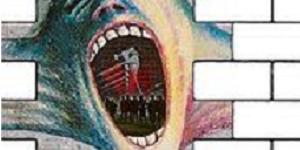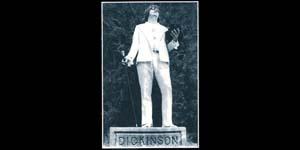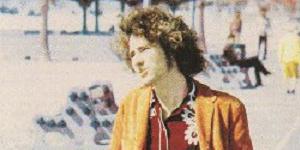The 100 Greatest Songs of the 1970s, Part IV.

085. Pink Floyd “Comfortably Numb”
(David Gilmour/Roger Waters)
The Wall, 1979
I know you’re not gonna believe this, but I’ve never listened to The Wall. Or watched it, for that matter. I only know the song from AOR radio, which is probably why I like it so much. As I may have mentioned before, I’m a pop guy. Concept albums and multi-disc suites are all very well in theory, but just give me a damn song, and I couldn’t be happier. So I have no idea how this fits in to the grand overarching scheme of rock’s most notoriously excessive concept-album statement about the soul-crushing horror of being a rock star or whatever, but I do know that pretentious self-important twaddle has never sounded more compelling, that glistening million-dollar space-age textures have never sounded so emotional (even if the emotions are fractured, blunted, and miasmic), and that David Gilmour’s crescendoing solo at the end — even though mental flashes of millions of be-mulleted air-guitarists around the world playing along are inevitable — is one of the finest examples of late-70s playing, in that overly-tightassed, perfectly-sculpted way that always makes me think of billionaires doing cocaine on a space station. Like I said, I’m a pop guy, and the perfect pop moment in the song comes just after the words “there’ll be no more.” You know what I mean. Still overly-mannered and emotionally dead, but still, a cry from the heart.
084. Gil Scott-Heron “The Revolution Will Not Be Televised”
(Gil Scott-Heron)
Pieces of a Man, 1971
There will be no pictures of pigs shooting down brothers on the instant replay. There will be no pictures of pigs shooting down brothers on the instant replay. Even though I, a bourgeois honky more or less in bed with The Man, don’t have the right to call black men my brothers except in the most general Christian sense and have no particular quarrels with law enforcement even though I’m perfectly aware that I would not have gotten off scot-free that one time if I were less than lily-white, I still love that line, or rather the repetition of that line, which makes the jump from spoken-word to actual goddamn rap. Now that everyone from Chuck D to the Roots has acknowledged Scott-Heron’s importance in the development of rap (not to mention the development of radical black consciousness), I wouldn’t be surprised to see a new compilation of his work in Starbucks; but he’s still dangerous. Not just because he dares to use the word revolution (and back in 1971 it was infinitesimally closer to an actual threat), but because all of black music, past and future, finds a locus in him — even in this song. Backwards through funk, soul, jazz and the blues, forward to — well, most of us have lived through the next steps. He was right that the revolution would not be televised; what he didn’t mention was that soon, very soon, everything would be televised. And there wouldn’t be any room left for revolution.
083. James Luther Dickinson “Wine”
(The Nightcaps)
Dixie Fried, 1972
Novelist and critic Nick Tosches has been calling this record one of the great American musics for the past thirty-some years, but it remains a wild, uncivilized secret, one shared by a devoted few with surreptitious nods and suddenly-jerked heads whenever we hear anything that sounds remotely similar. It reaches back into the primordial dawn of American music, long before that boy Edison and his gramophonomatichord started pumping blood into Billboard’s veins, before there was much of a distinction between country and blues or anything else, when everything in American culture that was not sanctioned by stiff-collared European precedent was raw and violent and rock & roll. This is a deviant take on the country-blues rhythm number “Drinkin’ Wine, Spo-Dee-O-Dee,” originally cut by Stick McGhee in 1946, set afire with a daemonic flame by Jerry Lee Lewis in 1957, and completely overhauled and given a new chassis by Dallas garage band the Nightcaps in 1962. Legendary Memphis producer and session man Dickinson loads the song up with hard-rock signifiers, but also refuses to take the easy way out, remaining true to the song’s country-blues roots: the result is a huge unsanctified noise, with several guitars, pianos, drum kits, basses, gospel backup singers, and what I swear to God sounds like panes of glass being shattered piling on top of each other fighting for space under Dickinson’s throaty roar. If you close your eyes and turn it up as far as you dare, it’s damn close to rock & roll nirvana.
082. Tim Buckley “Starsailor”
(John Balkin/Larry Beckett/Tim Buckley)
Starsailor, 1970
And then there’s the Kid A outtake. Well, at least it doesn’t sound like much else released in the pop market in the past thirty years. Actually, this is a serious compositional piece; Buckley wanted to push the frontiers of pop to keep up with experimental tape-loopers like Karl Penderecki and György Ligeti, and this is a brief snatch of free verse in — well, here, the “composer’s notes” that every lyric-bot website reproduces will explain:
Harmonic structure: a set of horizontal vocal lines is improvised in at least three ranges, the vertical effect of which is atonal tone clusters and arhythmic counterpoint. Performance: the written melody is to be sung, after which the lines of lyric are to be reordered at will and sung to improvised melody, taking advantage of the opportunity for quartertones, third note lengths, and flexible tempo.So yeah. I’m too clod-ignorant to know what any of that actually means, but I do know that it sounds fucking cool. Apparently, after the release of this album, the record company told him to make his music more accessible or he wouldn’t be allowed to record any more; within five years, he was dead.

081. Bruce Springsteen “Rosalita (Come Out Tonight)”
(Bruce Springsteen)
The Wild, the Innocent & the E Street Shuffle, 1974
You know the famous line about Springsteen’s Born to Run sound being that of a ’57 Chevy running on melted-down Crystals 45s? This is where that started. Actually, it’s all of early-60s rock & roll: the Beach Boys, Del Shannon, Roy Orbison, Sam Cooke, King Curtis, Dion & the Belmonts, Duane Eddy, the Coasters, “Spanish Harlem,” and the entire Phil Spector universe, painstakingly disassembled and then reconfigured, with stunning postapocalyptic vision, into a post-Dylan barroom soul-rock epic that signals not only the advent of a new voice in rock & roll, but that the way forward in rock was not to leave behind the goofy teenager-in-love drama of pre-Invasion American pop, but to embrace it, with all the goofiness and splendor that it entails. Although he became deeper, more soulful, more artistic, and even, eventually, more hip, he never again sounded like he was having quite so much fun — when he shouts “the record company, Rosie, just gave me a big advance!” you can hear the honest delight in his voice, because they really just had — in making rock & roll. It’s the most adrenal, pop, delirious, charismatic multi-suite song in age of tedious, wanky, sensitive, and pompous multi-suite songs, one huge crescendo after another, until finally the whole band is just chanting orgasmically. This does make three songs in a row, however, where the final sound is feedback draining from the amps. Make a note of that, someone.
Next: 080-075. >>

No comments:
Post a Comment